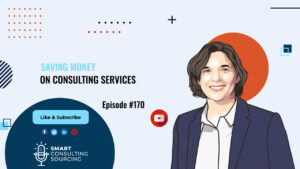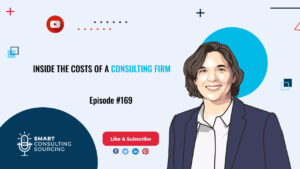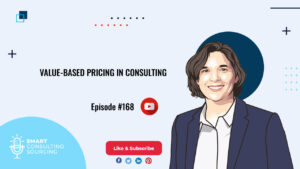Hello and welcome to the episode 21 of our podcast, smart consulting sourcing, the podcast about consulting procurement.
My name is Helene and I’ll be your host today.
Each week I’ll give you the keys to better use, manage and source consulting services. This week I’ll discuss about the RFP for consulting services.
Last week I discussed the make or buy strategy and what it looks like for the consulting category.
We saw how collaboration is important when handling consulting services because that’s how you create more value. But this week I’d like to go back to some basics and I name it the RFP.
Do you really need an RFP?
So, the question that I’m often asked is: “Do I really need an RFP for consulting services?” And the answer is simple, yes you do.
You know writing well-defined requirements is an important step to a successful consulting project. And that’s true even when you don’t organize a tender. So, why is it so important? Defining the expectation and the goal of a project is the best way to get the results you need.
So the first tip is to clarify the expectation. Everyone has to be on the same page and by everyone I mean, the consultants and I mean the internal stakeholders, the project sponsor, and the project manager.
It’s also a good way to make sure that you only buy what you need, not more, not less. It also helps you define the standard for performance evaluation. When you want, in the end, to measure how well you did during the project, it’s good to have set the expectations at the beginning so you have something to compare to.
And last but not least, you need to build some references if there’s a conflict with the consulting firm. And you have to prepare for the worse every time. nd having some expectations clarified will help you to discuss with the consulting firms with some solid concrete basis.
What are the advantages of writing an RFP?
But, Writing an RFP has also other advantages. You know that when you implement a project internally, one of the most challenging parts is to get people to accept it and to get buy-in.
And having them involved, at the very beginning of a project at the inception of what the project will cover, will help you to get the buy-in of these internal stakeholders.
Another advantage is that it will help you explore solutions that you didn’t envision. What is interesting is that if you put several people in the room and you put on the table the problem that you want to solve instead of directly the solutions, you might be surprised by the experience and the direction that the discussion is going to.
So it’s very important to get there and to open your mind to other things that you may not have thought about.
It’s also a very good way to collect information about the consulting firm. You know when you work with a consulting firm that you know already, it’s less relevant, that that specific part.
But when it’s a new consulting firm, that’s an excellent way to get to know their approach, to get to know their references and the staffing that they have, the resources that they have available; so it’s a very good way to know them.
And it may not end up with them getting the project this time. But that means that you will know them and maybe on another project you will get them on board and work with them.
Is it always an RFP?
So another question is, is it always an RFP? Actually, it’s not and that will depend on where you are in the process of launching your project.
Let’s say that you’re in the ideation phase. And you’re asking yourself those questions: should I launch a project or what are the options for me to solve that problem? That means that the needs and the scope are not defined.
In that case, your best option is to launch an RFI. It’s a request for information. And you will explore potentials with the consulting firms and then you will decide if you want to go to the next step.
And the next step is the execution phase, and at that point, your question is: what consultants can help me attain my objectives? So, when your needs and the scope are clear, that means that you’re ready to launch an RFP.
But actually, there are options in between. So, sometimes you’re clear on the problem to tackle but not on the approach. In that case, you might want to use a hybrid process, which is mixing RFI in the first round for instance, and then an RFP process.
If you are clear on the problem to tackle and the approach to use, but you’re flexible on the delivery model and the format, then you should go for an open RFP, where the consultants can get creative: they can bring you solutions.
And I have an example for that on a project that we worked on a couple of years ago. The company/the client wanted to roll out a new organization that had been defined at the group level and they wanted to roll it out in one of the subsidiaries.
And they wanted a company, or consulting firm to help them, you know get the buy-in of the teams, define the interfaces and define the new ways of working in that group. And so we had several consulting firms coming in. And, one of them came up with a game.
So, they proposed to design a game to help all the players, all the stakeholders to understand their roles and get them to define those new interfaces. And that was not something that was asked for by the client when we made them the RFP. But that’s the company they work with and it was very successful.
So, it means that when you leave some room for creativity you could end up with something that you didn’t think of, but actually is very effective for your project.
So, what does it mean really for the sourcing process?
It means that you need more collaboration. You need to get on board the project sponsor, the project leader, the procurement leader, and the main stakeholders in order to really get that buy-in that we discussed before, but also both the deep understanding of the problem to solve from the project sponsors and project leaders and as well the respect of the procurement policies with the procurement leader.
When you work on a larger project or project that was strategic, you should add someone from strategy and someone from finance. But that system also is a prerequisite for implementing demand management and make or buy strategy.
Because if you’re not clear on the scope of the project there’s no way you can estimate the budget and there’s it’s going to be very difficult to assess how strategic it is.
And it also means that the procurement has to clarify the expectation for an RFP. They need to be clear on what elements they want to find in an RFP, how detailed should the RFP be, and that specific part can depend on the size or the strategic value of a project.
It should also be clear what the steps are to take when defining an RFP and also what are the roles and responsibilities of the different participants in creating the RFP.
So you see that writing the RFP is not only a pure procurement activity. It’s of course the first step to taking control of your consulting spend but also a very good way to increase collaborations and get the buy-in of the different stakeholders at the beginning of a project.
It will help you improve the relationship with the consulting firm because you add transparency and clarity to the relationship. And it will help also the procurement to improve their credibility for the consulting category with the internal stakeholders.
So, it’s a very important part of the procurement process for consulting services and again this is an exercise that you should take for every project.
So, that’s it for today. Next time I’ll discuss with Laurent Thomas about the disruption of the construction industry.
In the meantime, if you have any questions or want to learn more about what we do at Consulting Quest just send me an email at Helene.laffitte@consultingquests.com.
You can also have a look at our website: smartconsultingsourcing.com to know more about our book and download free templates and guides to improve your consulting sourcing.
Bye and see you next week! Au revoir!







